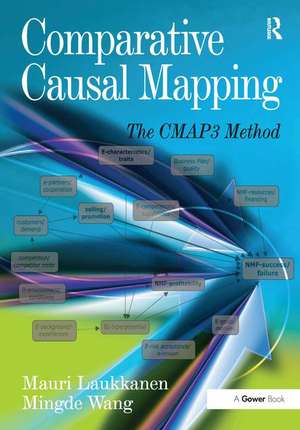Comparative Causal Mapping: The CMAP3 Method
Autor Mauri Laukkanen, Mingde Wangen Limba Engleză Hardback – 28 mar 2015
| Toate formatele și edițiile | Preț | Express |
|---|---|---|
| Paperback (1) | 260.93 lei 6-8 săpt. | |
| Taylor & Francis – 12 dec 2019 | 260.93 lei 6-8 săpt. | |
| Hardback (1) | 767.93 lei 6-8 săpt. | |
| Taylor & Francis – 28 mar 2015 | 767.93 lei 6-8 săpt. |
Preț: 767.93 lei
Preț vechi: 1029.61 lei
-25% Nou
Puncte Express: 1152
Preț estimativ în valută:
146.96€ • 152.86$ • 121.33£
146.96€ • 152.86$ • 121.33£
Carte tipărită la comandă
Livrare economică 14-28 aprilie
Preluare comenzi: 021 569.72.76
Specificații
ISBN-13: 9781472439932
ISBN-10: 1472439937
Pagini: 270
Dimensiuni: 174 x 246 x 23 mm
Greutate: 0.66 kg
Ediția:1
Editura: Taylor & Francis
Colecția Routledge
Locul publicării:Oxford, United Kingdom
ISBN-10: 1472439937
Pagini: 270
Dimensiuni: 174 x 246 x 23 mm
Greutate: 0.66 kg
Ediția:1
Editura: Taylor & Francis
Colecția Routledge
Locul publicării:Oxford, United Kingdom
Public țintă
Professional Practice & DevelopmentCuprins
Concepts in comparative causal mapping. Comparative causal mapping. Computerizing CCM with CMAP3. From raw data to analyzable output. Cause map analysis tools in CMAP3. CCM research in practice.
Recenzii
’This book is the perfect gateway to causal mapping. Its hands-on approach will be invaluable for graduate students and scholars alike.’ Daniela Stockmann, Leiden University, the Netherlands ’This text has much to offer for both beginners and advanced practitioners of comparative causal mapping. It provides a thorough and systematic overview of the field with useful tips for researchers. An excellent addition to the methodologist’s tool-kit.’ Catherine Cassell, Leeds University Business School, UK ’This book presents in a highly accessible yet scholarly form, an introduction to the theory and practice of comparative (cognitive) causal mapping (CCM), centred on the authors' CMAP3 software. Although the authors' main focus is on their own particular approach, there are many useful insights and lessons for all users of CCM techniques, novices and experienced users alike.’ Gerard P. Hodgkinson, University of Warwick, UK
Notă biografică
Mauri Laukkanen is Professor emeritus of the University of Eastern Finland, Department of Business, Kuopio Campus. He received his PhD (DBA) at the Helsinki School of Economics in 1989. He served at the HSE (now Aalto University Business School) and the Universities of Vaasa and Jyvaskyla before UEF, where he helped found and headed the present Department of Business in 1995-2002. His research interests include entrepreneurship in local economic development, organizational cognition and cognitive mapping methods using CMAP3 software.
Mingde Wang is a Marie Curie Fellow in the PRIMO INT Network funded by the European Commission, and a doctoral student at the Department of Politics and International Relations, University of Oxford. He received his master’s degree in International Relations from Leiden University, and was a lecturer of East Asian relations in the University of Erlangen-Nuremberg. His research focuses on international politics and political psychology.
Mingde Wang is a Marie Curie Fellow in the PRIMO INT Network funded by the European Commission, and a doctoral student at the Department of Politics and International Relations, University of Oxford. He received his master’s degree in International Relations from Leiden University, and was a lecturer of East Asian relations in the University of Erlangen-Nuremberg. His research focuses on international politics and political psychology.
Descriere
The cognitive movement has proven robust, with CCM methods and research serving not only scientific, typically explorative objectives, but also pragmatic purposes such as problem solving and decision support, systems planning and organizational interventions. Comparative Causal Mapping is an essential introduction to causal (cognitive) mapping exploring the different interpretations and motives for using them, the technical aspect of using CMAP3 (a thoroughly revised version of an original 1998 CCM-CMAP3 guide) in different research situations, and typical cases of CM/CCM-research. The book will appeal to both academic and professional audiences, in particular to doctoral students and experienced researchers looking for new topics and method approaches, but also to practitioners in fields such as management training and knowledge management.
